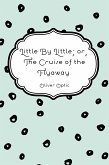This historical novel from Anthony Hope presents a fictionalized version of a fascinating episode in English history: King Charles II's long-time dalliance with Nell Gwyn, the most acclaimed comedic actress of the era, an affair that produced two sons. Hope treats the often sensationalized romance with sensitivity and nuance.
Dieser Download kann aus rechtlichen Gründen nur mit Rechnungsadresse in A, B, BG, CY, CZ, D, DK, EW, E, FIN, F, GR, HR, H, IRL, I, LT, L, LR, M, NL, PL, P, R, S, SLO, SK ausgeliefert werden.



